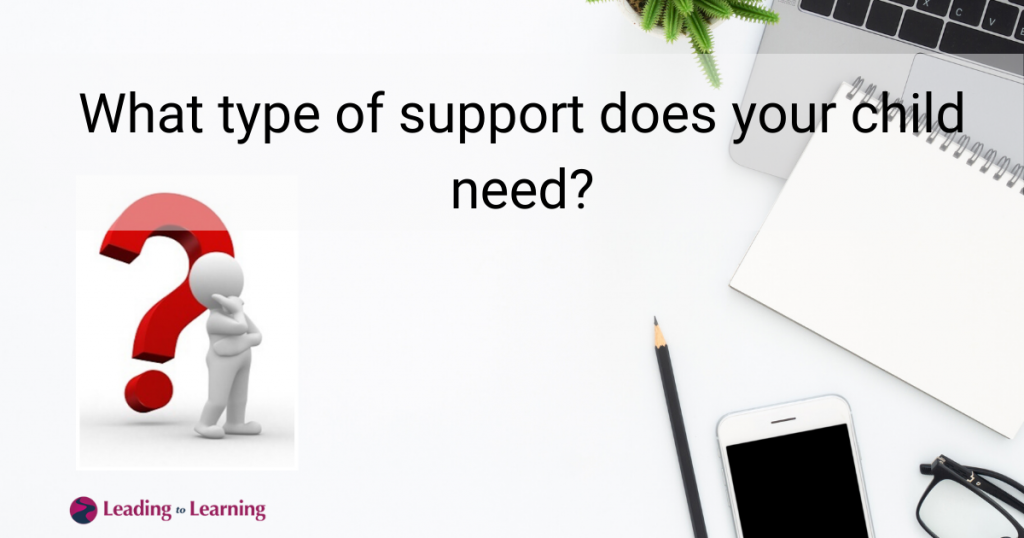I know that you give your child all the support you can to succeed in school. I also know that many parents, just like you, get frustrated and exhausted trying to support their child learning.
This happens when the support you are offering is not the type of support your child needs.
Have you ever wondered if you were giving your child the right kind of support? Support that would make a difference in your child’s learning life?
Well, when you have read this you will know if you are doing the right thing and, if you are not, you will learn what to you can do instead.
You are going to learn about the process of learning and why children need different types of support at different stages.
I will show you how to discover the type of support your child needs right now so you can make a difference in your child’s ability to learn.
First you have to understand that learning is a process. It took me many years to understand learning this way. I had assumed that you either learned something or you didn’t. It never occurred to me that people didn’t learn because they were stuck in the process of learning. They didn’t know how to take the next step in the learning process. They didn’t know how to get out of one stage and into the next.
Learning is about moving from one stage of the process to the next. Getting stuck in one stage means that a child either struggles to learn or stops learning altogether!
Once you discover which learning stage is giving your child trouble you can decide on the support that will help him or her move on.
Providing the wrong kind of support, the kind of support that does not match where your child’s is in the learning process, is a recipe for disaster.
Here are the four stages that make up the learning process.
Stage one – Motivation
Motivation is the desire to learn. Without it learning will not take place.
There are many kinds of motivation. One child might be motivated to learn in order to get good marks or to show what he can do. Another might want to learn to please her teacher or because her peers are learning something and she wants to be part of the group. Motivation can also be negative. A child might be motivated to do something because he or she does not want to be punished in some way.
All children are born with a desire to learn but this desire can be knocked out of them when they fail repeatedly.
- These children need emotional support to help them change their attitude to schoolwork. The first step would be to discover why the child has no desire to learn and then put in place strategies to counteract his or her negative attitude.
Whatever the reason without motivation your child will never start on the process of learning.
Stage 2 – Knowing how to learn
If you have read my post ‘The one secret to your child’s success’ you will know how important it is for children to learn how to learn. Teachers are too busy teaching the curriculum (I know because I was one!) to spend too much time helping children learn how to learn even if they knew how to do it.
Once a child is motivated to learn, wants to learn, then he or she needs to develop the skills that allow this to happen. Children who are motivated to learn will be open to developing these vital foundational skills but sometimes one or more of them gets missed or not fully developed. Then the child has trouble learning. Learning becomes difficult and children start to think they cannot learn and begin to lose their self-confidence.
In my experience the main reason that bright children struggle to reach their full learning potential is because they are missing or underusing one or more of these skills.
It breaks my heart when I meet bright kids who are starting to think that they are stupid and cannot learn when all they need to do is develop a basic skill that will unlock their abilities.
I call these kids Seed Pod Kids, children who are trapped in their ‘pod’, just waiting for the right kind of support that will help them break free.
- Children who are stuck on this stage need support to help them develop learning skills. They need to understand why they are struggling to learn and that there is something that can be done about it.
Stage 3 – Making Sense of School
The third learning stage is the ability to adapt and make every learning experience useful and productive.
We all know that children like some teachers more than others. Some teachers are more caring than others but that is not the only reason children have preferences. Children tend to like teachers who teach the way they like to learn.
Children have multiple types of intelligence. Professor H. Gardner was the first to describe eight types of intelligence (find out more here****) and it is safe to assume that children use their best form of intelligence to help them learn.
For example, children who are Self Smart learn best when left to work things out on their own, those who are Number Smart learn best when they are given a structure to follow and Word Smart children and learn best by reading, writing, speaking and listening.
Then there are children who are People Smart who learn best with others around; Nature Smart, who learn best when they have a connection to the outside world; Music Smart, children who learn through rhythm and language and Body Smart, children who have to move to be able to learn.
There is nothing wrong with any of these ways of being Smart. Most children have a mix of three or more of these learning preferences.
The problem occurs when the way they are being taught does not match the way they learn best. When this happens students have to find ways to adapt how they are being taught to how they like to learn.
For instance; I am a Picture Smart learner. I learn by looking, watching, using diagrams and graphic organizers. When I answer my phone I need to have a pencil in my hand so that I can take notes and illustrate them in some way. When I plan blog posts I create a Mind Map, a diagram which shows me what I need to include.
Being mainly Picture Smart was fine while I was in primary school. Teachers used picture and diagrams to help us learn. Then I moved into Grade 4 and the teaching style changed. I was expected to read more and to listen to instructions rather than having a to do list that I could look at and check off.
Suddenly learning became more difficult.
Fortunately, I was able to adapt the way I was being taught to the way I like to learn. My notebooks were full of arrows, scribbles, underlining and highlighting!
Teachers teach in three ways. Most teachers expect students to follow a set pattern of work, (good for Number Smart learners), they use text books (good for Word Smart learners) and expect student to learn on their own (good for Self Smart learners).
What if your child’s learning preference is not one of these three?
Then your child has the added burden of adapting how they are being taught to how they like to learn.
Many children have no problem doing this but a significant number of children find this hard to do. These children cannot make sense of school!
- These children need strategies that help them adapt how they are being taught to how they like to learn. They need to know what their learning preferences are and be taught ways to use their preferred learning styles.
The fourth stage of learning is Move to Mastery.
Students may want to learn, have the skills they need to learn and be able to make sense of school but need extra support to master learning, to make it their own.
Students who need support to Move to Mastery may have missed some critical lesson, misunderstood something they were taught, need extra practice or want to learn something – perhaps a musical instrument – that is not taught in school.
Why do you need to know about the four stages of learning?
For the simple reason that each stage requires a different type of support.
Unfortunately, most parents think that children need support at the fourth stage – Moving to Mastery – and rush to buy workbooks and hire tutors. This type of support only works when a child needs help with the fourth stage of learning. It doesn’t work well if the child needs help with one of the other stages. Parents often waste time, money and effort finding and hiring tutors when their child needs a different type of support.
- If a child needs support to Move to Mastery qualified teachers and tutors can help them practice and review what they want to learn. Your child needs you to choose the best tutor or tutoring program, one that matched how he or she learns best.
How do you decide the type of support that will make a difference in your child’s learning life?
Look at each of the following sections and decide which relates to your child.
- The first stage of learning – Motivation*
A child who lacks motivation –
- Avoids doing homework
- Is happy to ‘just get by’
- Says school is “stupid”
- Doesn’t want to learn
- Doesn’t want to go to school
- The second stage of learning – Learn how to learn
A child who needs support in this stage –
- Has been struggling for more than a year
- Needs help in more than one subject
- Tries hard but makes little progress
- Is anxious and upset about their lack of learning
- Nothing you do seems to work
- The third stage of learning – Make School Make Sense*
- A child who needs help in this stage of learning may have –
- Changed schools recently
- Has moved from primary to intermediate or intermediate to high school
- got lower grades this year than last
- likes some teachers more than others
- You know that your child could do better
- The fourth learning stage – Moving to Mastery*
The child is –
- Bored at school
- Needs help with a specific subject
- Needs to prepare for a test or exam
- Has missed some lessons
- Wants some extra support
Which of these descriptions relate most to YOUR child?
Now you know what type of support your child needs you can provide support that makes a difference.
If you need to discover the exact strategies that will lead your child to learning check out my website or contact me and we can chat.







